模块1 Unit 4 Earthquakes reading[上学期]
文档属性
| 名称 | 模块1 Unit 4 Earthquakes reading[上学期] |
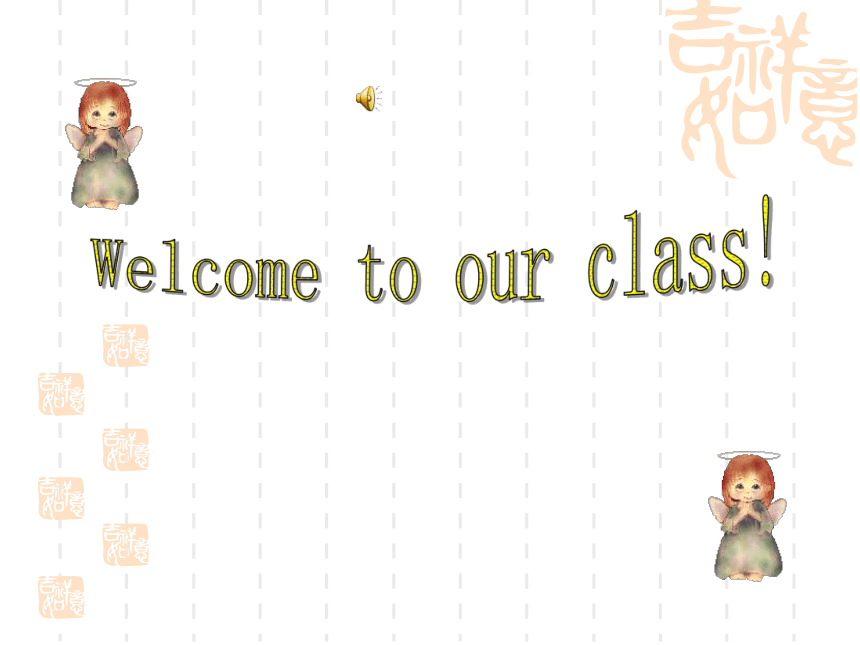
|
|
| 格式 | rar | ||
| 文件大小 | 540.1KB | ||
| 资源类型 | 教案 | ||
| 版本资源 | 人教版(新课程标准) | ||
| 科目 | 英语 | ||
| 更新时间 | 2007-10-14 00:00:00 | ||
图片预览

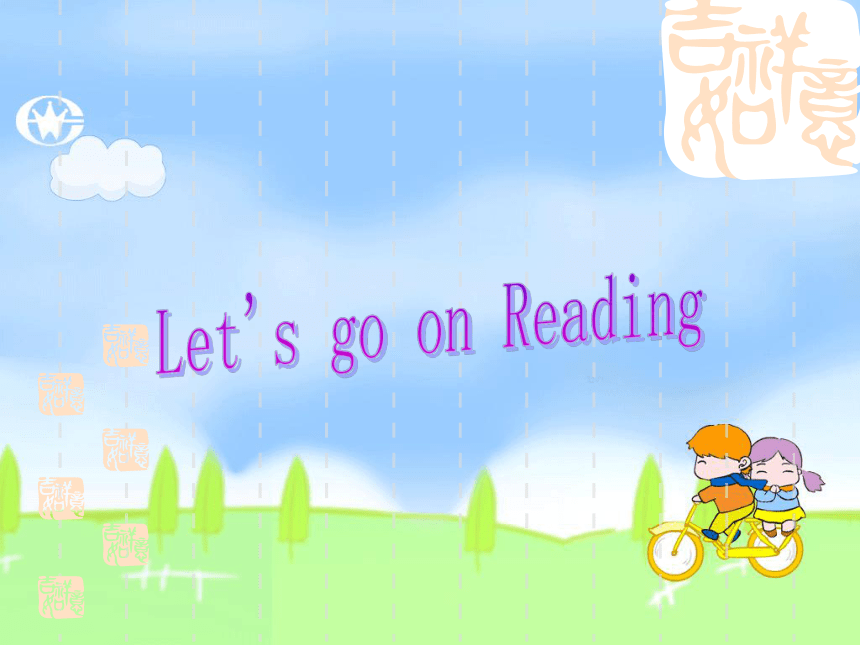
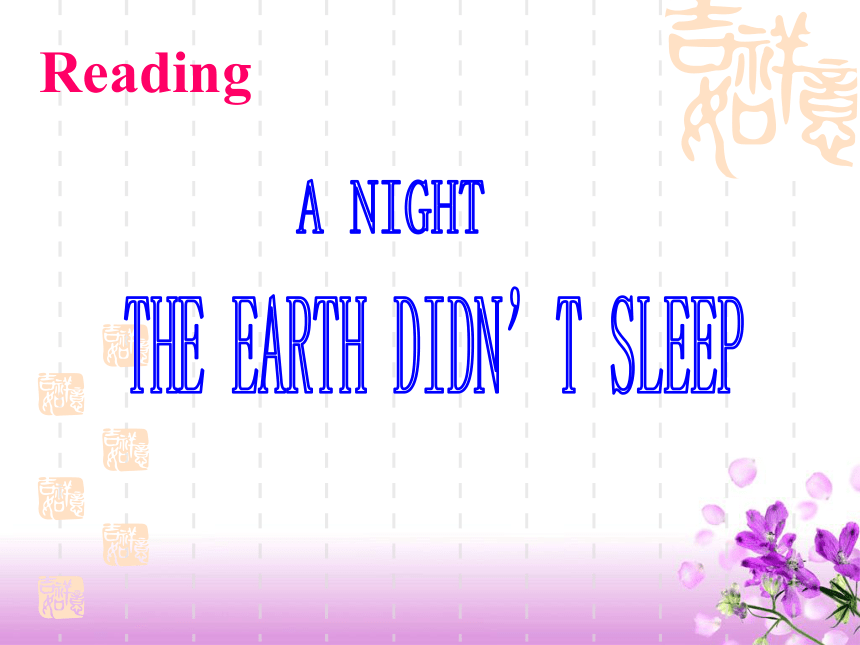
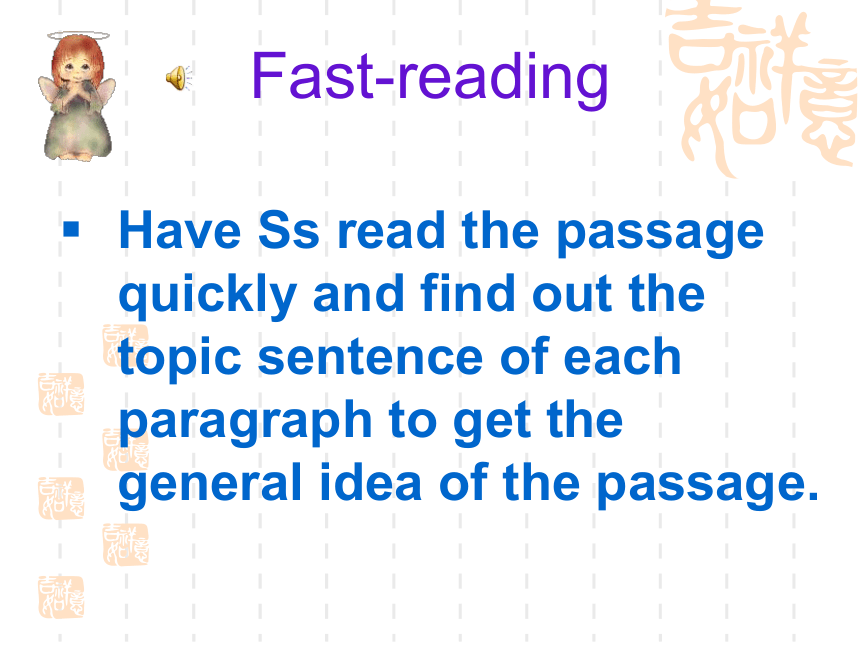
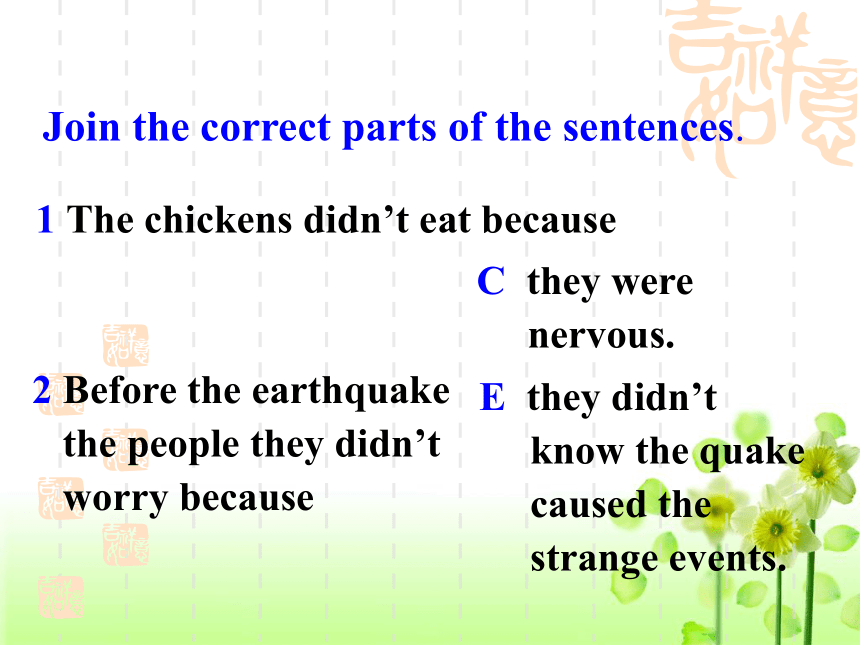
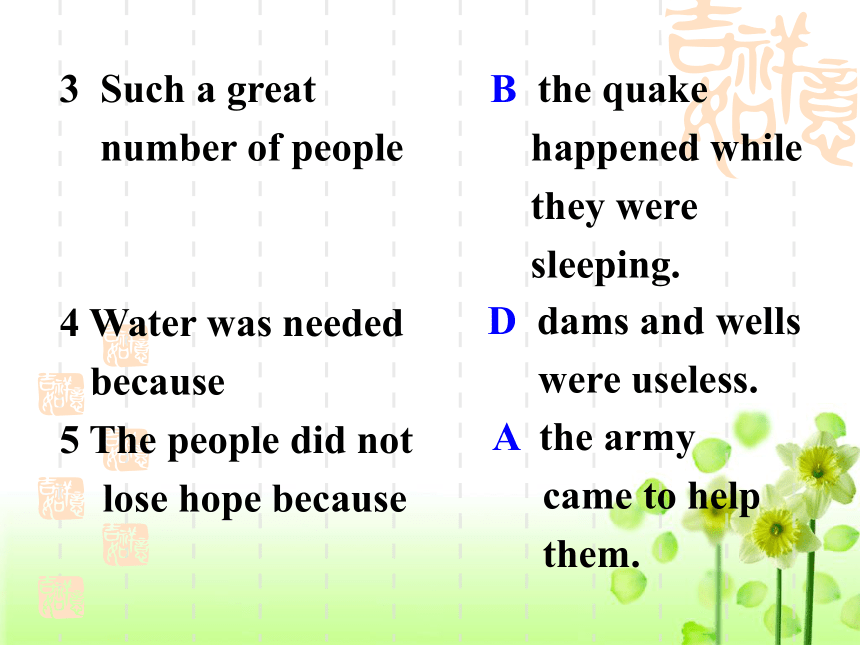

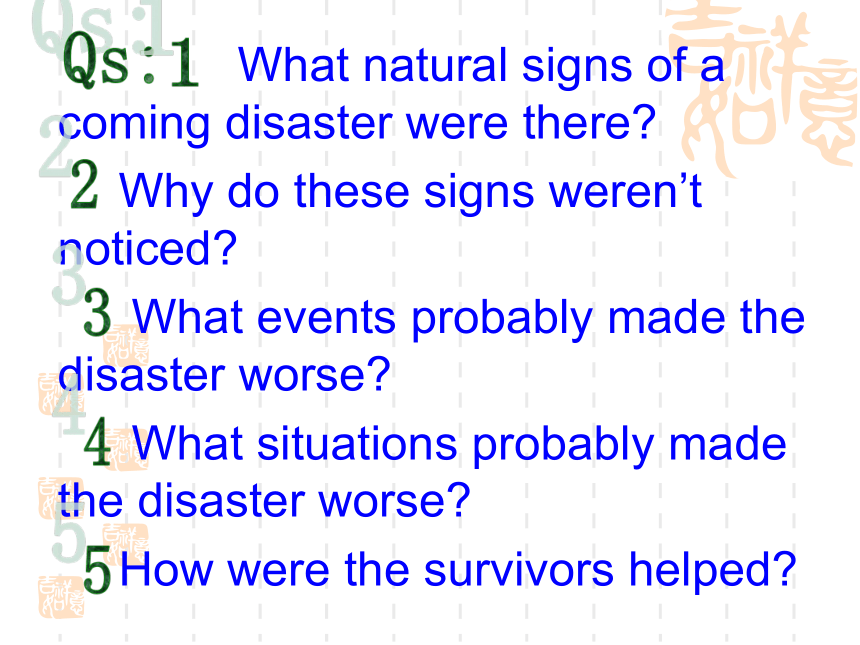
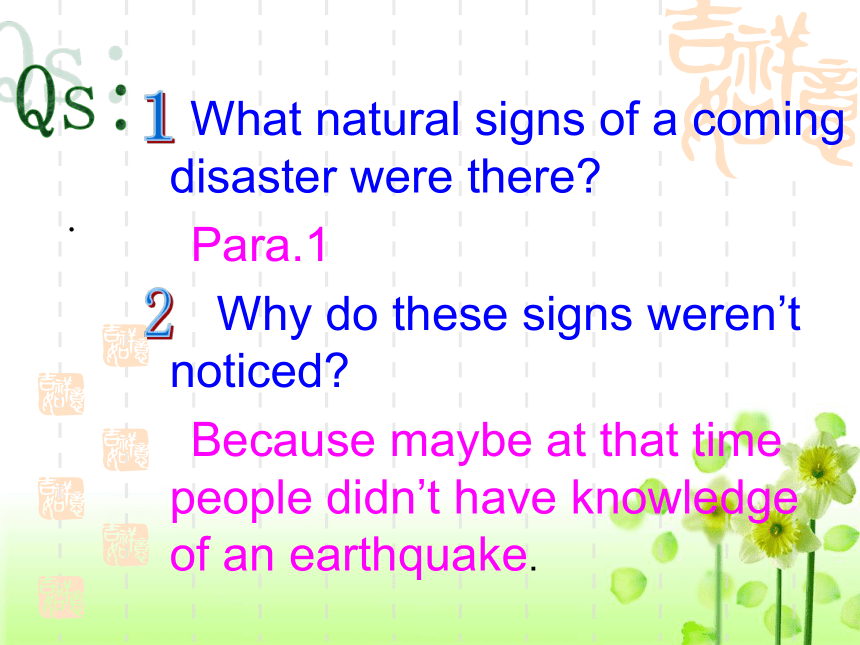
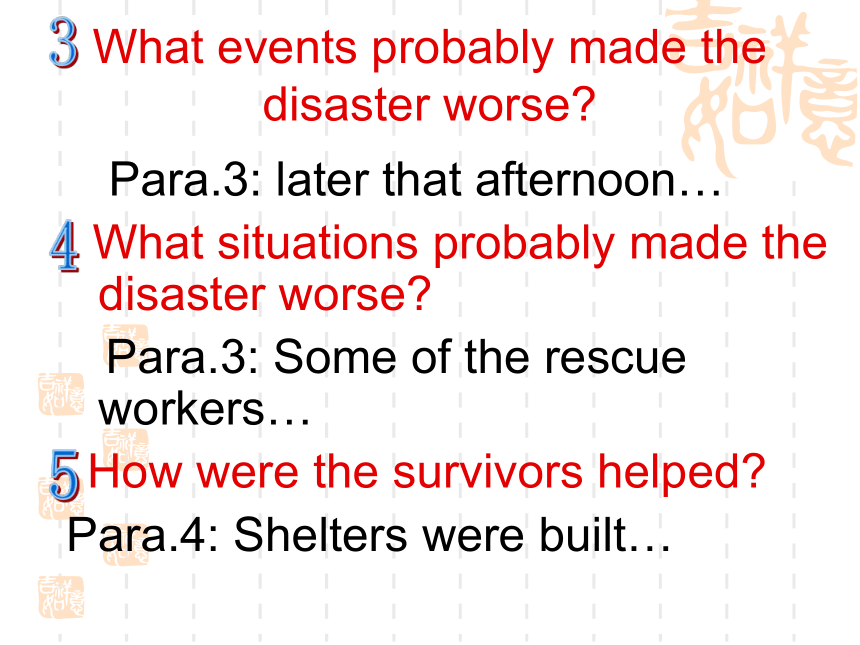
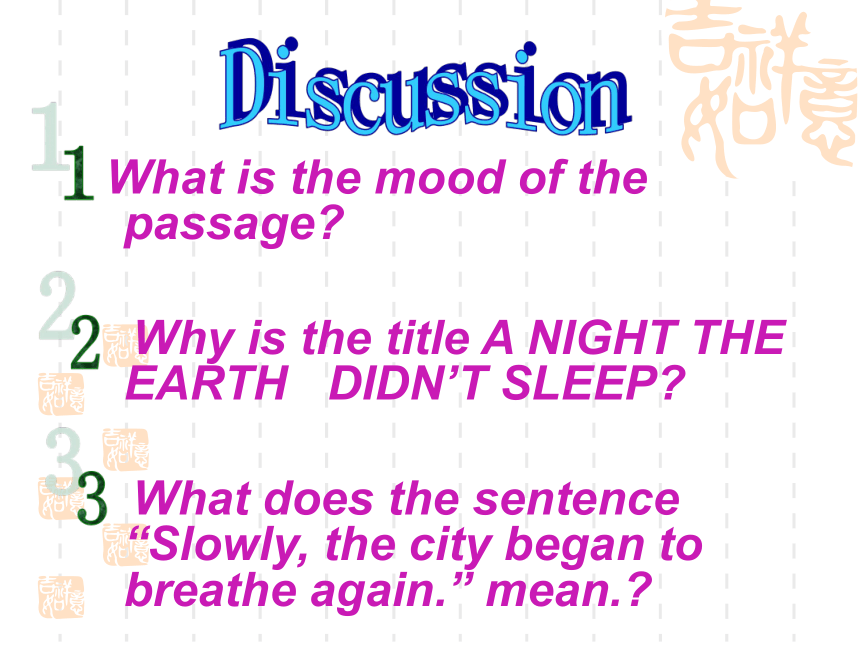
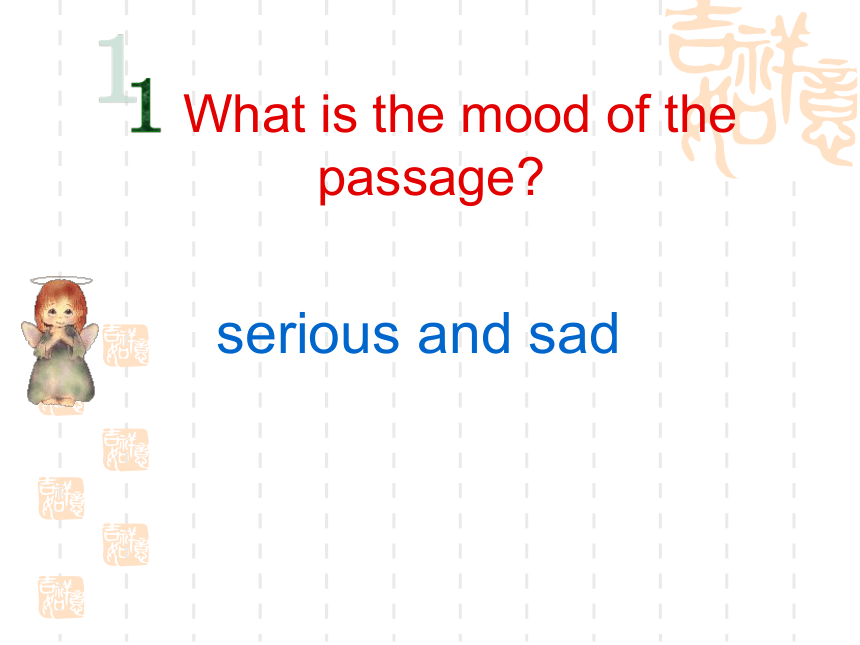
文档简介
课件37张PPT。
Welcome to our class!Let's go on ReadingTHE EARTH DIDN’T SLEEPA NIGHT Reading Fast-readingHave Ss read the passage quickly and find out the topic sentence of each paragraph to get the general idea of the passage.Join the correct parts of the sentences.2 Before the earthquake
the people they didn’t
worry because 1 The chickens didn’t eat because C they were
nervous. E they didn’t
know the quake
caused the
strange events.3 Such a great
number of people
4 Water was needed
because
5 The people did not lose hope becauseD dams and wells
were useless.B the quake
happened while
they were
sleeping.A the army
came to help
them. Read the text again carefully to obtain some details and answer the following questions. What natural signs of a coming disaster were there?
Why do these signs weren’t noticed?
What events probably made the disaster worse?
What situations probably made the disaster worse?
How were the survivors helped? Qs:12345. What natural signs of a coming disaster were there?
Para.1
Why do these signs weren’t noticed?
Because maybe at that time people didn’t have knowledge of an earthquake. Qs:21What events probably made the disaster worse? Para.3: later that afternoon…
What situations probably made the disaster worse?
Para.3: Some of the rescue workers…
How were the survivors helped?
Para.4: Shelters were built…
345 What is the mood of the passage?
Why is the title A NIGHT THE EARTH DIDN’T SLEEP?
What does the sentence “Slowly, the city began to breathe again.” mean.?
Discussion123 What is the mood of the passage?
serious and sad
1 Why is the title A NIGHT THE EARTH DIDN’T SLEEP? As usual, night is the time to sleep and it should be safe and quiet. But that night everything changed. The writer used the title to show how terrible and unusual the night was.
2 What does the sentence “ Slowly, the city began to breathe again.” mean.? The writer compared the city to a person who suffered a lot in the disaster. It means the city won’t die. 3 Retell the story ____________ happened in Tang Shan. For a few days, water in the wells _____________. From the ______ of wells __________come out. Mice, chicken, pigs and even fish became ________. At 3:00 am, everything began to ______.It seemed that the world was _________. _________ of the nation ____ it. ___________cut across the city. The city lay _______. Strange thingsrose and fellcrackssmelly gasnervousshakeat an endOne-thirdfeltA huge crackin ruinsTwo-thirds of the people _____ or ___________. Then later that afternoon, another big quake ______ Tang Shan. People began to wonder ___________________________. But all hope ____________. _______ came to help those ________. Slowly, the city began to _____________.diedwere injuredshookhow long the disaster would lastwas not lostSoldiersbreathe againsurvivorsLanguage pointsHe _____from his chair when the door
bell rang.
Her job is _______chickens.
Her temperature is still______.
He ________ in rank recently.1. Rise vi. 作上升时,指继续上升,常用于日,月,云,雾,物价,温度,河水,及人的职务等. raise vt.举起,提出,饲养,培养,种植等.
roseraisingrisinghas risensmelly : smell+ y = adj.
smell n./v (smelt/ smelled)
They were all hungry and the food ______good.
I can ______something burning in the kitchen.
Please throw the _______fish away.smeltsmellsmelly smelly2. A ______ gas came ___ __ the cracks.smellyout of3. … the water pipes in some buildings cracked and _____.burstburst : to come open or fly apart suddenly
The balloon suddenly burst.
burst into + n.
Some robbers burst into that house.
burst out
burst out + doing
They burst out laughing.He burst into laughter.
= He burst out laughing
He burst into tears.
= He burst out crying.
burst into+ n.
burst out + doing……4. It seemed that the world was __ ___ ___.atanendat the end of 用于表示具体事物或场所的场合,它也可以用来表示比喻意; by the end of 用于表示时间的场合到……结束的时候,用语过去完成时态; in the end 意思“最后、终于”。 Compare: at the end of
by the end of
in the end1) . His father will return home ___________this year.
2) . He will be a scientist __________.
3) . How many English words had you learned ____________ last term?at the end ofin the endby the end of5. In fifteen terrible seconds a large city
lay in_____.ruinslie (lay, lain): to be, remain or be
kept in a certain state
in ruins : severely damaged or
destroyedCompare: ruin ;
destroy ;
damage ①damage指部分“损坏”、“损害”、“破坏”或指使用价值有所降低。它可以用作动词,也可以用作名词,用作名词时常与to something 连用。
The accident did a lot of damage to his car.
②destroy 只能用作动词,指彻底破坏,以致不可能修复,常作“破坏”、“毁灭”解,也可以指希望、计划等打破。
The earthquake destroyed almost the whole town. ③ruin则表示破坏严重,以致不能修复,但这种破坏不像destroy那样毁灭某物,而是强调致使该物的使用价值发生了问题。用作动词时,它作 “使毁灭”、 “使崩溃”、 “弄糟”解;用作名词时,它表示 “毁灭”、 “瓦解”、 “废墟”等抽象概念。ruin也有借喻的用法。
The fire ruined the castle.
The house has fallen into ruin.
The company is facing ruin. The village ___in ruins after the war.
These machines have ____idle since the
factory closed.
An earthquake left the whole town_______.
His career is________.laylainin ruinsin ruinsEverywhere they looked nearly everything was_________. destroyedHe ______ his girl friend’s prospectsruinedSoft wood ________easily.damages injure: to hurt oneself/ sb. / sth. physically6. Two-thirds of the people died or were _______ during the earthquake.injuredMore than 61% of the surface of the earth ____covered by water.
Seventy percent of the workers in this factory ____ young.isareTheir criticisms _________him deeply.
Smoking will ________his health.
He was slightly ________in the car accident.
He got _________in the fighting.
What you said _____my feeling.have hurtinjureinjurewoundedhurtCompare: injure ;
hurt ;
wound wonder : v.
A. to have a feeling of surprise.
B. to be filled with curiosity or doubt.
n. one that arouses astonishment,
surprise ; admiration
It is no wonder (that)= No wonder (that)wonder7. People began to ________how long the disaster would last.---Tom often works deep into the night
every day.
---No wonder he always gets first in the
examinations.8. All hope was not lost.
all…not … = not all…;some… but not all
Not all the children are left.
(= Only some of them left early.)
Not all the children are noisy.
(= Some of the children are not noisy.)
? none of …..
None of us were allowed to go there.
None of these reports is very helpful.9. … bury the dead.
bury : A. to place in the ground
B. to occupy (oneself) with deep
concentration; absorb
The dog buried the bone in the ground.
I buried myself in my studies.
bury oneself in= be buried in
devote oneself to= be devoted toDiscussionWhat can we do to reduce the damage of earthquakes?How can we protect ourselves and help others in the earthquake?keys1. Build houses along the lines where two of the earth’s plates join together;
2. Build the houses on rock than on sand.
3. Make the houses as strong as possible,
weak buildings will fall down in an earthquake.1. Practice reading the whole text.2. Finish off the exercise.
Learning about language.
the people they didn’t
worry because 1 The chickens didn’t eat because C they were
nervous. E they didn’t
know the quake
caused the
strange events.3 Such a great
number of people
4 Water was needed
because
5 The people did not lose hope becauseD dams and wells
were useless.B the quake
happened while
they were
sleeping.A the army
came to help
them. Read the text again carefully to obtain some details and answer the following questions. What natural signs of a coming disaster were there?
Why do these signs weren’t noticed?
What events probably made the disaster worse?
What situations probably made the disaster worse?
How were the survivors helped? Qs:12345. What natural signs of a coming disaster were there?
Para.1
Why do these signs weren’t noticed?
Because maybe at that time people didn’t have knowledge of an earthquake. Qs:21What events probably made the disaster worse? Para.3: later that afternoon…
What situations probably made the disaster worse?
Para.3: Some of the rescue workers…
How were the survivors helped?
Para.4: Shelters were built…
345 What is the mood of the passage?
Why is the title A NIGHT THE EARTH DIDN’T SLEEP?
What does the sentence “Slowly, the city began to breathe again.” mean.?
Discussion123 What is the mood of the passage?
serious and sad
1 Why is the title A NIGHT THE EARTH DIDN’T SLEEP? As usual, night is the time to sleep and it should be safe and quiet. But that night everything changed. The writer used the title to show how terrible and unusual the night was.
2 What does the sentence “ Slowly, the city began to breathe again.” mean.? The writer compared the city to a person who suffered a lot in the disaster. It means the city won’t die. 3 Retell the story ____________ happened in Tang Shan. For a few days, water in the wells _____________. From the ______ of wells __________come out. Mice, chicken, pigs and even fish became ________. At 3:00 am, everything began to ______.It seemed that the world was _________. _________ of the nation ____ it. ___________cut across the city. The city lay _______. Strange thingsrose and fellcrackssmelly gasnervousshakeat an endOne-thirdfeltA huge crackin ruinsTwo-thirds of the people _____ or ___________. Then later that afternoon, another big quake ______ Tang Shan. People began to wonder ___________________________. But all hope ____________. _______ came to help those ________. Slowly, the city began to _____________.diedwere injuredshookhow long the disaster would lastwas not lostSoldiersbreathe againsurvivorsLanguage pointsHe _____from his chair when the door
bell rang.
Her job is _______chickens.
Her temperature is still______.
He ________ in rank recently.1. Rise vi. 作上升时,指继续上升,常用于日,月,云,雾,物价,温度,河水,及人的职务等. raise vt.举起,提出,饲养,培养,种植等.
roseraisingrisinghas risensmelly : smell+ y = adj.
smell n./v (smelt/ smelled)
They were all hungry and the food ______good.
I can ______something burning in the kitchen.
Please throw the _______fish away.smeltsmellsmelly smelly2. A ______ gas came ___ __ the cracks.smellyout of3. … the water pipes in some buildings cracked and _____.burstburst : to come open or fly apart suddenly
The balloon suddenly burst.
burst into + n.
Some robbers burst into that house.
burst out
burst out + doing
They burst out laughing.He burst into laughter.
= He burst out laughing
He burst into tears.
= He burst out crying.
burst into+ n.
burst out + doing……4. It seemed that the world was __ ___ ___.atanendat the end of 用于表示具体事物或场所的场合,它也可以用来表示比喻意; by the end of 用于表示时间的场合到……结束的时候,用语过去完成时态; in the end 意思“最后、终于”。 Compare: at the end of
by the end of
in the end1) . His father will return home ___________this year.
2) . He will be a scientist __________.
3) . How many English words had you learned ____________ last term?at the end ofin the endby the end of5. In fifteen terrible seconds a large city
lay in_____.ruinslie (lay, lain): to be, remain or be
kept in a certain state
in ruins : severely damaged or
destroyedCompare: ruin ;
destroy ;
damage ①damage指部分“损坏”、“损害”、“破坏”或指使用价值有所降低。它可以用作动词,也可以用作名词,用作名词时常与to something 连用。
The accident did a lot of damage to his car.
②destroy 只能用作动词,指彻底破坏,以致不可能修复,常作“破坏”、“毁灭”解,也可以指希望、计划等打破。
The earthquake destroyed almost the whole town. ③ruin则表示破坏严重,以致不能修复,但这种破坏不像destroy那样毁灭某物,而是强调致使该物的使用价值发生了问题。用作动词时,它作 “使毁灭”、 “使崩溃”、 “弄糟”解;用作名词时,它表示 “毁灭”、 “瓦解”、 “废墟”等抽象概念。ruin也有借喻的用法。
The fire ruined the castle.
The house has fallen into ruin.
The company is facing ruin. The village ___in ruins after the war.
These machines have ____idle since the
factory closed.
An earthquake left the whole town_______.
His career is________.laylainin ruinsin ruinsEverywhere they looked nearly everything was_________. destroyedHe ______ his girl friend’s prospectsruinedSoft wood ________easily.damages injure: to hurt oneself/ sb. / sth. physically6. Two-thirds of the people died or were _______ during the earthquake.injuredMore than 61% of the surface of the earth ____covered by water.
Seventy percent of the workers in this factory ____ young.isareTheir criticisms _________him deeply.
Smoking will ________his health.
He was slightly ________in the car accident.
He got _________in the fighting.
What you said _____my feeling.have hurtinjureinjurewoundedhurtCompare: injure ;
hurt ;
wound wonder : v.
A. to have a feeling of surprise.
B. to be filled with curiosity or doubt.
n. one that arouses astonishment,
surprise ; admiration
It is no wonder (that)= No wonder (that)wonder7. People began to ________how long the disaster would last.---Tom often works deep into the night
every day.
---No wonder he always gets first in the
examinations.8. All hope was not lost.
all…not … = not all…;some… but not all
Not all the children are left.
(= Only some of them left early.)
Not all the children are noisy.
(= Some of the children are not noisy.)
? none of …..
None of us were allowed to go there.
None of these reports is very helpful.9. … bury the dead.
bury : A. to place in the ground
B. to occupy (oneself) with deep
concentration; absorb
The dog buried the bone in the ground.
I buried myself in my studies.
bury oneself in= be buried in
devote oneself to= be devoted toDiscussionWhat can we do to reduce the damage of earthquakes?How can we protect ourselves and help others in the earthquake?keys1. Build houses along the lines where two of the earth’s plates join together;
2. Build the houses on rock than on sand.
3. Make the houses as strong as possible,
weak buildings will fall down in an earthquake.1. Practice reading the whole text.2. Finish off the exercise.
Learning about language.
